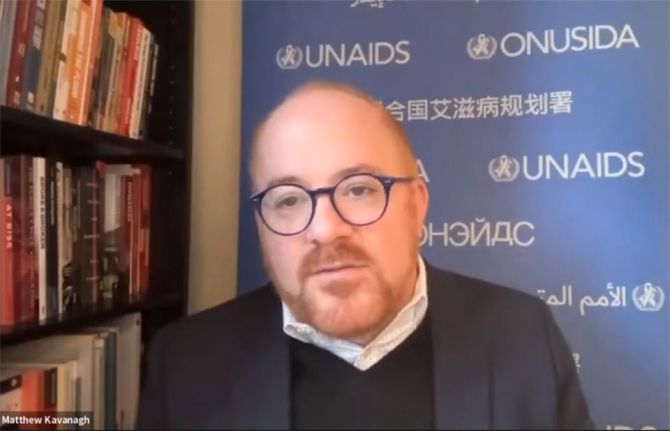

Feature Story
OHCHR report: human rights interventions are indispensable to ending AIDS for everyone by 2030
29 June 2022
29 June 2022 29 June 2022A new report presented to the Human Rights Council at its 50th session entitled “Human Rights and HIV/AIDS”, confirms that implementing societal enablers and fully respecting human rights are indispensable to ending AIDS as a public health threat by 2030.
Presenting the report, the United Nations High Commissioner for Human Rights, Michelle Bachelet described the report as a tool to help catalyze more determined efforts towards meeting the targets for 2025 and protecting the rights of people living with or affected by HIV.
“A human rights-based approach should be adopted in order to ensure that all policies relevant to the HIV response respect, protect and fulfil human rights, ensuring that key and other marginalized populations are empowered to claim their rights,” said Ms Bachelet.
The report recommends action necessary to achieve the societal enabler targets adopted by the General Assembly in its Political Declaration on HIV and AIDS: Ending Inequalities and Getting on Track to End AIDS by 2030. These include removing punitive legal and policy frameworks; reducing stigma and discrimination; and addressing gender inequalities and gender-based violence.
Societal enablers are structural and systemic factors, including legal, cultural, social and economic, that are critical to the effectiveness of the AIDS response. Implementing them would remove barriers in access to health services and enable individuals and communities to better protect their health and well-being. The main gaps and challenges remaining in the HIV response are in large part due to a continued failure to uphold human rights. The presented report makes it clear that upholding human rights and reforming laws or reducing stigma and discrimination is possible and is happening. However, in order to bring about such change we need to ensure action is long-term, led by community-led organizations and adequately funded. Acknowledging this, the report makes clear recommendations to ensure there is funding and support to community-led organizations, particularly those led by key populations who are often criminalized, and to reduce stigma and discrimination through multi-stakeholder platforms such as the Global Partnership for Action to Eliminate all Forms of HIV-related Stigma and Discrimination.
Commenting on the release of the report, Dr Tlaleng Mofokeng, Special Rapporteur on the Right to Health stated:
“In light of advancing health equity, people who experience multiple intersections of oppression, and health status that often leads to discrimination such as HIV, must be centred. This provides motivation for human rights-based approaches to HIV and thus for national laws and legislative frameworks to be examined not only for their protection of human rights, but to the extent that a life of dignity is supported in the realization of the right to health. Hostile laws and criminalization have no place in HIV care and related issues.”
Speaking at the event, UNAIDS Deputy Executive Director, a.i., Policy, Advocacy and Knowledge Branch, Matthew Kavanagh, said
“This is the first time that UN member states around the world have committed to specific targets on law reform and removing punitive laws. Laws and policies are critical HIV interventions. They can support people to access services and reduce risk, or they can drive discrimination and stigma. This is both urgent and necessary to get us back on track to ending AIDS by 2030. We have a unique opportunity right now to create significant and lasting change for our communities.”
Community activists welcomed the report and called on countries to implement the report’s recommendations in full to get the world on track to end AIDS as a public health threat by 2030.
“We, communities of people living with and affected by HIV have spoken out from the very beginning of this epidemic about our needs. We have campaigned for our rights and led the way, looking for innovative solutions to the challenges we face,” said Harry Prabowo, Project Coordinator at APN+ and GNP+ Regional Coordinator for Global Partnerships, “We are not just advocates, we are legal experts, peer educators and counsellors. We do not just access services, we design, implement and monitor them.”
“Investing in delivering a commitment that shapes the future of Africa that proves young people especially young girls and women have the ultimate power to change the narrative and bring about change on the issues affecting them including HIV/AIDS and gender-based violence is a long-term goal,” said Youth Representative from Education Plus, Rahma Seleman.
The closing comments at the event were made by Mikhail Golichenko of the HIV and Human Rights Reference Group.
“Criminalization of HIV non-disclosure and unintended HIV transmission, as well as the criminalization of drug use related behavior, sex work-related behavior, and the consensual same sex-related behavior, are among the major challenges to stop and reverse the global HIV epidemic.”



